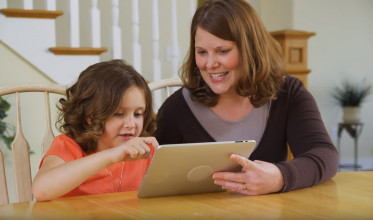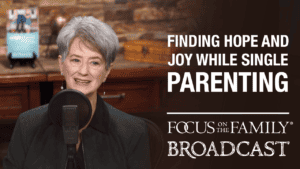Excerpt
Lee Strobel: Spiritual amnesia is when we get so worried and nervous and anxiety-ridden over our future because we’ve forgotten God’s track record of helping us in our past.
End of Excerpt
John Fuller: There’s a thought. I wonder if you have spiritual amnesia. Well, we’re going to help you consider that question, and give you some tools to deal with worry in these rather uneasy times on today’s episode of Focus on the Family with Focus president Jim Daly and I’m John Fuller.
Jim Daly: John, we have a real message of encouragement today and next time from Lee Strobel, and it’s very relevant to the situation we find ourselves in right now. Uh, Lee gave this message just 10 days ago at Woodlands Church, which has, uh, three locations in the Houston area. He’s addressing the coronavirus pandemic that we’re all familiar with right now, but he’s also making a much more important point. Meaning, we can’t allow ourselves to become slaves to fear and anxiety, no matter what our circumstances are. And we certainly have seen many expressions of both fear and anxiety. That’s something we all need to hear – that we need to trust is what the Lord is all about.
John: And Lee Strobel is a well-known name to many of us. He’s the author of over 40 books including The Case for Christ and is the former legal editor of The Chicago Tribune. Here now Lee Strobel on today’s episode of Focus on the Family.
Lee: Well, I don’t know if you’ve heard, but there is a virus going around. In fact, the experts say, “You know what? We’re in the middle of a pandemic.” But I’m not talking right now about the coronavirus. I’m talking about a different kind of virus. I’m talking about the virus of worry. Course our legitimate concern over the coronavirus is fueling a lot of our worries these days, but the point I want to make is this: our tendency to fret and to worry and to be anxiety-ridden and to be fearful goes far beyond just the current medical crisis. One prominent psychologist called worry “one of the most urgent problems of our day.”
I remember when I was growing up I always worried that my brothers were going to beat me up. Uh, when I got to high school, I worried about wearing the right clothes, and hanging around with the right crowd, and then getting into the right college. Then I went to college and I started worrying about getting drafted into the Vietnam War. Uh, I worried about whether I’d get a job after I graduated. And then I graduated and then I’m at the Chicago Tribune and I used to worry about getting scooped by the competition or getting sued for liable. And then I became a father and I started to worry every time my kids would get sick or, um, any time they’d get a call from a member of the opposite sex.
I mean, I wish I could honestly tell you that since I’ve become a follower of Jesus Christ – all of those worries have kind of dissipated – they’ve evaporated and now everything is full of joy and peace. But, that’s not the truth and you know that.
I mean, there’s still days when I stare into the darkness at night. Now I worry about my grandchildren. And now I worry whether I’m going to make my next book deadline. Or I worry that my cholesterol is going up. Or I worry that the coronavirus is going to come knocking at my door. So, let’s be honest. We all worry, don’t we?
In fact, recent studies showed that two out of five Americans worry every single day. And it’s not just a problem in our culture. We can go back to Biblical times and we see that Biblical figures experienced it too. Going all the way from King David all the way up to the Apostle Paul. Even Jesus endured incredible anxiety before He was crucified. Matthew chapter 26 verses 36-38 tell us this, “Then Jesus went with His disciples to a place called Gethsemane and He said to them, ‘Sit here while I go over there and pray.’ He began to be sorrowful and troubled. Then He said to them, ‘My soul is overwhelmed with sorrow to the point of death. Stay here and keep watch with Me.'” In fact, His anxiety was so intense that Luke adds this detail in Luke 22 verse 44. He says, “And being in anguish, Jesus prayed more earnestly, and His sweat was like drops of blood falling to the ground.”
Now, when I was skeptic, I used to think, “Come on. Give me a break. Whose ever heard of sweating blood? Certainly, that just shows that these Gospel writers are making this stuff up. That’s exaggerated. That’s hyperbole.”
But then I did some research. You know what I found out? There is a known medical condition called hematidrosis and in this particular condition its where severe anxiety causes the release of chemicals that break down the capillaries in our sweat glands. And as a result, there’s a small amount of bleeding into our sweat gland and our sweat actually does come out tinged with blood. In fact, I found an article in the Journal of Medicine that analyzed 76 cases of hematidrosis and they concluded the most common causes were acute fear and intense mental contemplation.
But here’s the difference between Jesus and us: Jesus was in anguish because He knew what was coming. We often wrestle with worry because we don’t know what’s coming. In other words, in many ways it’s the uncertainty over the future that fuels our worries. The unknown seems ominous and it seems dangerous.
Now, there are times when worrying can actually have good effects. Worrying can be good when it’s what psychologists call “productive worrying.” When it causes us to pursue answers and solutions to problems that we’re facing. But when worry and anxiety are allowed to run amuck, as they do, by the way, in one out of every ten Americans. When that happens, physicians tell us it can lead to all kinds of health issues. It can lead to depression. It can lead to insomnia. It can lead to premature coronary artery disease. It can even cause heart attacks.
So, when worry sets in – when anxiety sets in – what should a Christian do? Well, I’ve found that Christians have some advantages when, um, we wrestle with worry because we know – we recognize what worry really is. For us, worry is a form of “spiritual amnesia” – spiritual amnesia.
Now, we all know what amnesia is, right? I used to know. I – I – I had – it was on the tip of my tongue (laughter). No, we all know what amnesia is. Well, let me tell you what spiritual amnesia is. Spiritual amnesia is when we get so worried and nervous and anxiety ridden over our future because we’ve forgotten God’s track record of helping us in our past. Let me repeat that. Spiritual amnesia is when we get worried and nervous and anxiety ridden over our future because we’ve forgotten God’s track record of helping us in our past.
Let me give an example from the Bible – from the sixth chapter of the Gospel of Mark. This is where Jesus has been teaching to 5,000 people and verses 35-37 say this, “Late in the afternoon, the disciples came to Jesus and said, ‘Tell the people to go away to the nearby villages and farms and buy themselves some food. For there’s nothing to eat here in this desolate spot and it’s getting late.'”
In other words, the disciples are worried. We got this huge crowd sitting here. What do you do? What do you do? It seems impossible to deal with this situation. But Jesus puts it back on them. It says, “But Jesus said, ‘You feed them.'” (Laughter) And that freaks the disciples out. Now they’re really worried. Now they’re really wringing their hands. They say, “With what?” They say, “It would take a fortune to buy food for all of this crowd.” And the disciples are kind of in panic. Why? Because they were in the midst of spiritual amnesia. They forgot!
Mark chapter 1 where Jesus supernaturally healed Peter’s mother of a fever and where verse 34 says, “He healed many who were sick with various diseases.” And they forgot how in Mark chapter 2 He healed the paralytic man right there in Capernaum. And Mark chapter 3 where He healed a man’s shriveled hand right there in the synagogue. And in Mark chapter 4 how He calmed the storm that was threatening to capsize the boat that the disciples were in. And they forgot how in Math – Mark chapter 5 He raised a 12-year-old girl from the dead.
So right before their own eyes, Jesus had repeatedly demonstrated miraculous power over sickness and over nature and even over death. And if they’d remembered all that, they wouldn’t have been so nervous about Him merely feeding 5,000 people. They would have relaxed and said, “Oh, He’s got this. He can handle this.” And in the end, He did. He ended up multiplying five loaves of bread and a couple of fish and feeding the entire crowd.
But here’s the kicker. Just two chapters later, Jesus is again talking to a crowd. This time 4,000 people and guess what? He says He wants to feed them, too. But how do the disciples react? Do they keep their cools and say, “(Chuckle) We’ve seen this all before. No problem. Jesus has got this handled”? No. They are in the midst of spiritual amnesia. They whine and they complain, and they get all worried and they grouse. And in Mark 8 verse 4 they say – it says, “And His disciples replied to Jesus, ‘How can anyone fill and satisfy these people with loaves of bread here in the desolate and uninhabited region.'”
Hey, that’s perfect example of spiritual amnesia. If would remembered how He had fed the 5,000 they’d say, “Of course He can feed 4,000.” And, naturally, He did. This time with seven loaves of bread and a few fish.
John: I appreciate that perspective by Lee Strobel today on Focus on the Family. He’ll be sharing, uh, more solutions to this problem of spiritual amnesia, in just a moment.
Jim: John, I have to admit – I feel better knowing that even the disciples, who had seen Jesus’ miracles in person – in their own families, like Peter’s mother-in-law and others – how they had a hard time trusting Jesus with their problems. And, uh, that really helps me when I’m thinking about my own lack of faith.
John: Yeah, the Scripture is full of great reinforcements for those times that we have doubt and we do tend to compensate by trying to anticipate every potential outcome. In reality, the best thing we can do is just commit the problem or our concern – the circumstance – to God.
Jim: Which sometimes that’s easier said than done.
John: I have to admit that is easier said than done. Uh, we do want to encourage you, get a CD of this entire two-part program when you make a donation of any amount to Focus on the Family today. You can do that by calling 800, the letter A and the word FAMILY. Or at focusonthefamily.com/broadcast. Let’s go ahead and return now to more from Lee Strobel.
Lee: And so, we hear those stories and we stop, and we think, “Well, what kind of idiots were these disciples?” But, then, say, “Wait a minute. What about me? What about all of the times when I get mired in worry because I’ve forgotten while – how God has come through for me time, after time, after time in the past.”
Of course, the – the antidote to forgetting is remembering. And the Bible gives us a specific prescription for how to get over our tendency toward spiritual amnesia. We find it in Philippians chapter 4 verses 6 and 7. It says this, “Do not be anxious about anything, but in every situation, by prayer and petition with thanksgiving, present your request to God. And the peace of God, which transcends all understanding will guard your hearts and your minds in Christ Jesus.” In other words, we pray. We pray. Let’s face it. It’s hard to be paralyzed by worry and at the same time be praying to God. But notice this is a specific kind of prayer. This is a prayer that specifically includes thanksgiving. And so, the first step we can take as we pray is to practice what some people call “thank God therapy” – thank God therapy.
Here’s what that means. First, we pour out our hearts to God. We tell Him honestly about the anxiety we’re going through. I like what a friend of mine tweeted just a couple of days ago. She said, “Praying has a better chance of changing tomorrow than worry.” (Laughter) I thought that was really good. “Praying has a better chance of changing tomorrow than worry.” So, we pray.
But the second thing is part of our prayers, we thank God. We thank Him for the promises that He has made to us and we thank Him for His track record of caring for us. For example, we thank God that He knows all about our present individual situation and that He wants the very, very best for us. We thank Him for His promise that He will meet our needs. We thank Him for His promise that He will cause whatever happens to His followers ultimately to work together for our good. We thank Him for the ways He’s come through for us in the past even – even when we’ve been in the midst of doubt. And then we – we enumerate some of those examples and we thank Him individually for how He came through for us. We thank for His promise that He’ll never desert us. We thank Him that He intervenes in our circumstance at exactly the right time, in exactly the right way, to accomplish exactly what He wants to accomplish in our lives.
We thank Him for His promise in Isaiah 41 verse 10 that says, “So do not fear for I am with you. Do not be dismayed for I am your God. I will strengthen you and I will help you. I will uphold you with My righteous right hand.” And we thank Him for His promise in Joshua 1 verse 9. Says, “Do not be afraid. Do not be discouraged. For the Lord your God will be with you wherever you go.”
Can you see how this expression of thanksgiving – what this accomplishes? The first thing it accomplishes is it appropriately honors God for who He is and what He does. In other words, this is a form of how we worship God. But then secondly, it refocuses our thinking. Instead of merely being mired in our worries, we’re reminded of His power. We’re reminded of His promises to care for us. We’re reminded of His commitment to us regardless of the circumstances we find ourselves in. It reminds us of all these things and that helps us refocus our thinking.
1 Peter 5:7 tells us, “Cast all your anxieties on Him.” Why? “Because He cares for you.” In Psalm 56 verse 3, “When I am afraid, I put my trust in You.” Friends, Christianity does not immunize us against the virus of doubt. But you know what it does? It gives us a good treatment plan that works. I mean, I counted 18 times in the Gospels where Jesus specifically gives tells people, “Do not be afraid.” He said in John 14 verse 27, “Peace I leave with you. My peace I give you. I do not give to you as the world does. Do not let your hearts be trouble and do not be afraid.” In other words, “Remember. I’m still in control” God says. He says, “I’m still on the throne.”
So, the first thing we do in dealing with our worries is to practice thank God therapy. The second step we can take is to help God turn our anxieties into solutions. And we do that by turning our “what if” questions into “how can I” questions. Let – let me explain what I mean by that.
Often, when we’re wracked by worry, we fall into a pattern of torturing ourselves with these what if questions, you know. “What if I can’t pay my mortgage this month? What if, um, I do a terrible job at my interview for my promotion at work? What if my doctor gives me bad news? What if the stock market continues to plummet? What if I -I don’t get that promotion at work?” And as a result, we go into this spiral of worry. As Corrie ten Boom said, “Worry is like a rocking chair. It keeps you moving, but it doesn’t get you anywhere.”
Instead, ask God to help you re-frame the question. Instead of dwelling on “what if?”, turn the question into “how can I.” For example, you might be fretting about whether you’re going to pass a course at college and you’re really worried about this final exam. And you’ve been torturing yourself with the what if questions. “What if I fail this final exam? Everything is riding on this final exam. What if I fail this final exam?” Instead, turn that into a “how can I” question. Like this, “How can I prepare properly so I can do well on the exam?” Now we’ve moved from the worry side to the solution side.
Or let’s say you’re stuck in a pattern of asking yourself, “What if my girlfriend dumps me? What am I going to do? What if my girlfriend dumps me?” And it’s leading to anxiety and it’s leading to depression. Instead, turn that into a “how can I” question. “How can I deepen my relationship with my girlfriend.” Or, maybe arrange a candid conversation with her about how we’re really doing in our relationship. Or maybe your fixated on, you know, “What if the coronavirus infects me? What if I get the coronavirus?” Instead ask God to help you seek solutions. Ask the question, “How can I take appropriate precautions to stay safe?”
See what I mean? When we turn our “what if” questions into “how can I” questions it can get us out of this cycle of worry and can help us concentrate on solutions. The Bible says this in Proverbs 16 verses 3 and 4, “Commit to the Lord whatever you do, and He will establish your plans. The Lord works out everything to its proper end.” But before we end, I have to address one other worry that is so common among a lot of people. This is sort of the elephant in the room. Why are we so afraid of the coronavirus? Because it’s 10 times more lethal than the common flu and many of us worry about death.
In fact, 35% of Americans are so worried about dying that they’re afraid to even talk about the subject. They just avoid the topic altogether. Death really is the biggest fear in our culture.
Last week at 8:30 in the morning, I got a telephone call from my sister Lareena. And she informed us that my older brother Ray, uh, had died of the flu. Uh, he had had fairly routine surgery, but he was weak after the surgery. They put him in a – a nursing facility to help him gain his strength. And in that nursing facility he contracted the flu and he died. And I’ll tell you that really brought home the severity of what we’re facing as a country and as a world.
John: Pastor Lee Strobel on Focus on the Family. And my goodness, Jim, his family is dealing with tragedy as well, right now.
Jim: Yeah, boy, that really brings it home. And, uh, let me remind you, if you have lost someone recently to the flu, or the coronavirus, or any other cause, please call us. We have caring Christian counselors here at Focus on the Family available to help you. To think through where you’re at, what you’re going through. To ease some of that anxiety and fear and perhaps even depression. And to point you in a local direction to get more help if that’s what needed. But we’re here for you. That’s what I want you to hear.
John: Yeah. And our number is 800, the letter A, and the word FAMILY. Of course, there is a pretty high call volume right now, so we might have to take your name and number and give you a call back. But, uh, we do want to make sure we schedule that consultation with them. Again, our number is 800, the letter A, and the word FAMILY.
Jim: And let me say thank you to the donor community who makes this possible. I mean this is a perfect time for us to acknowledge in this situation people that are giving sacrificially so that we can have those counselors available to people who really need them. Thank you for standing with us. And, John, I want to turn the corner to spiritual amnesia. Because that’s such an important idea what Lee was referring to. Uh, when we continue tomorrow Lee will go into more detail about how we, as Christians, uh, can respond to the prospect of dying. And I’ve said this many times, “We’re all going to face it one way or another.” Uh, Lee goes into why he’s so certain that we will be reunited with Christ in that moment. And I’ve found that one way to overcome spiritual amnesia is to write down what the Lord has done for us. Keep a journal of those things that we know God stepped in and provided a way for us. And as I’ve said in the past, I’ve kept a journal like this for each of the boys over the years. And I’ll tell you what, um, there’s a lot of answered prayers in there. And, uh, one example is when Trent was younger, he was having terrible nightmares. And I remember hearing him, you know, moaning and – and screaming in his bedroom. And I went in – he was probably 6 – 7-years-old – and I woke him up and I said, “Trent, you’ve gotta remember to call on the name of Jesus. Be sure to do that.” And, uh, he assured me that from that point forward whenever he was having a bad dream or something like that, he would call out to Jesus and use Jesus’ name.
John: Hm.
Jim: And it solved that problem for him. And I think that was a great faith builder in his circumstances.
John: Yeah, we’ve – we’ve had so many answers to prayers over the years. A lot of them dealing with physical safety. We had, uh, one child at about 18 – 20 months walk out the front door in the middle of winter and was gone for like 20 minutes. We were praying. We had another child that, uh, dealt with an eating disorder. We prayed heavily. A lot. Just with – with great burdens on our heart for her. And so, uh, we as a family have done the same, Jim. We’ve tried to capture those answered prayers and look back on those in times like this where we have to be reminded God’s got this. He’s sovereign. He’s in control. We don’t have to panic.
Jim: Well, you know, the one thing, John – we could sit there in fear and anxiety or we could use this time in a wiser way. And that would be to spend that time with your family. You know, Trent’s been at his first of college apartment. And he was kind of bee-bopping between the house and the apartment and I said, “Man, choose one and stick with it.” And so, (laughter) as an 19-year-old would, he chose to stay at the apartment. But Troy and I have just had some incredible time together. We, uh, went out, uh, as this was all breaking – the coronavirus – and we bought some model, uh, you know, kits that we could put together at the kitchen table together. And it’s been great spending time painting and talking about things. And then Jean and I, you know, we’ve spent a lot of time reading the Word together and praying together. Praying for the staff – for the donor community here at Focus. So, it’s been really good to use that time in a more productive way than just being, uh, gripped by fear and anxiety. Uh, you know, Focus on the Family we want to help you make the most of this time when you’ll have more opportunities to create those family moments. And one thing I’m excited about right now is the number of people signing up for the Adventures in Odyssey Club. Last week alone we had something like 40,000 people, uh, take us up on a 30 day free subscription. And I’d encourage all of you with kids in the home, maybe even teenagers in the home, to go ahead and take us up on that offer. Get Adventures in Odyssey. It’s a wonderful way to pass time. There’s 800 episodes. (Laughter) It’s – it’s a lot of listening that you can do. But there’s so many things we can do in this, uh, coronavirus situation to bring the family together. To talk about eternal things. That’s what we should spend the time on. And praying for people that we know. Um, I know this is an especially difficult for single parents, so let me encourage you, especially, to take advantage of these free resources from Focus on the Family. We want to be here with you and for you. So, do that. And if you’re in a position to help Focus – that’s great. What I’m trying to say right now and the tone that we have is – we know people are struggling and, uh, we’re going to have a few weeks – maybe months of this. Take care of your church, but if you can remember us, both in prayer and with some financial support so we can stand in the gap and be there for people. And let me say thank for you when you do. We deeply appreciate it.
John: When you make a donation today we’d be happy to send a CD of this entire presentation from Lee Strobel just to encourage you to maybe have you pass along to somebody else and you can donate and get the CD when you call 800, the letter A, and the word FAMILY. Or you can stop by focusonthefamily.com/broadcast. On behalf of Jim Daly and the entire team, thanks for joining us today for Focus on the Family. I’m John Fuller inviting you back as we once again, uh, continue the presentation from Lee Strobel and help you and your family thrive in Christ.






















